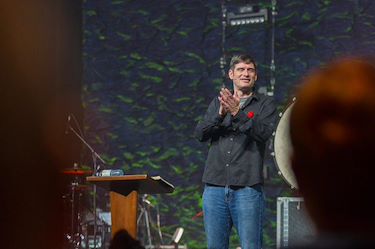Don’t let Beth Napayok’s quiet manner fool you. She is a very determined woman—in her work, in caring for her two children, in her relationship with Jesus Christ, and in her wish to be part of the Celebration of Hope in her hometown of Rankin Inlet, Nunavut.
Napayok was only seven when her mother suffered a fatal stroke, and only 7 ½ when her father also experienced medical problems and died. The young orphan moved in with her older sister, but that sister had serious addiction issues.
“It was hard living with her because she was on and off drugs and alcohol,” Napayok recalled. “I grew up rough. But then I said . . . I’m not going to follow in her footsteps and her path. I’m not going to let my kids go through what I went through,’ so I broke the chain.”
Napayok began working 12-hour days in a restaurant when she was only 16. She went to college and learned to drive one of the massive trucks that play an essential role at the Meliadine gold mine that’s a major employer in the Rankin Inlet region.
Napayok works 12 consecutive 12-hour days at the mine, then gets two weeks off. The 36-year-old single mother has been doing it for three years now, and intends to continue for as long as necessary to ensure her children—a 12-year-old son and an 11-year-old daughter—are properly raised.
“When I started at the mine—the first two months, I almost gave up,” Napayok recalled with a smile. “But I said, ‘I’m going to keep pushing it’ and eventually I got used to it.”
Despite her busy schedule, Napayok finds time to be a part of Rankin Inlet’s Glad Tidings Church—one of several partnering with the Billy Graham Evangelistic Association of Canada (BGEAC) to organize our first-ever Celebration of Hope in the Canadian Arctic.
When Napayok learned of plans for the Celebration—with its rounds of evangelism training, worship times and prayer events, culminating on Oct. 26 and 27 with two nights of live Christian bands, powerful testimonies, and Gospel messages from Will Graham—she was determined to be there with her kids.
Her first concern was ensuring she didn’t need to be working at the mine in late October. Napayok checked her shift schedule and confirmed she had days off during the Celebration’s outreach events.
“If I was going to be at work, I was going to ask for holidays,” she said, with that familiar look of determination. “I’m excited about Will Graham coming up. I’ll ask my (non-believing) friends (to go with me).”
Those friends have turned Napayok down in the past when she’s invited some of them to attend church. But it’s obvious from her life so far that Napayok doesn’t give up easily.
“They’ve said ‘no’ before, but they might be willing to go to the Celebration (because it’s different than church),” she said. “It would be great to get most of the community to come.”
Napayok knows some of her family members and friends are reluctant to embrace Christianity because of the role some denominations played in running the residential schools that took thousands of Inuit and other First Nations children from their homes—often subjecting them to physical, sexual, and psychological abuse.
Napayok never experienced residential schools, but sympathizes with those who were hurt by them. However, she’s also convinced the school experience should never be a barrier to God.
“Whatever happened, it’s not God (who should be blamed),” she emphasized. “God is love.”
Give To Celebration with Will Graham
